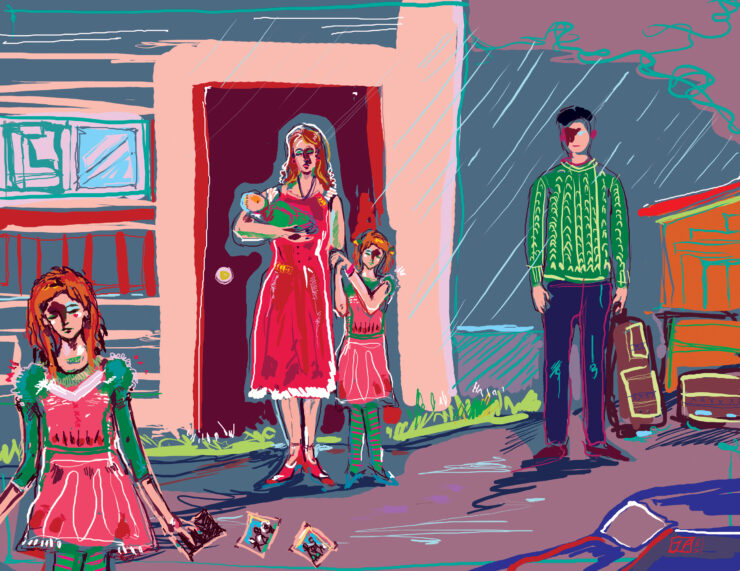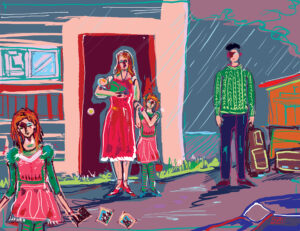Admit it. At one point or another, you’ve given thought to the idea of getting married. For some, the big day can’t come soon enough, while others would rather see their ring fingers chopped off than adorned with gold bands. Regardless of your stance, it’s safe to say most people don’t think, “Well, statistically speaking, I’m sure I’ll get married… And there’s a good chance I’ll get divorced, too.” We may not think that way, but according to a 2010 study by the Vanier Institute of the Family, we should. The study found 40 per cent of first marriages in Canada end in divorce.
The rate of marriage dissolution in this country begs the question: What about the kids? Fortunately for divorcing parents, there exist endless resources geared to help children make sense of the situation. Sure, a quick read-through of Mama and Daddy Bear’s Divorce or At Daddy’s On Saturdays is not a cure-all, but it’s a start. But what happens when your parents drop the divorce bomb when you’re too old to be placated by hugs and trite picture books?
Ignoring red flags
All the signs were there, but I did not see it coming. Toward the end of my second year of university, I scored a full-time summer job in my hometown. Not willing to pass up such a great opportunity, I sublet my bedroom to a friend and moved home for the summer.
At the end of April, my mother and younger sister made the eight-hour trek to Ottawa to collect me and my possessions. As we lugged boxes into the back of the van, I expressed annoyance at my father’s absence.
“We really could have used dad here, you know,” I said angrily to my mom as we both wiped sweat from our foreheads. “He could have done some of the heavy lifting.”
“He has a bad back,” she quickly responded. “Besides, you know how much more difficult he makes things. We’re better off doing this on our own.”
My parents’ marriage was not what anyone would call “happy” or “functional”—the word “volatile” comes to mind—and I knew my mother was right; however, I was still irked my dad wasn’t around to help out.
Later, my sister, mother, and I rewarded ourselves with a shopping trip. My mom, who was attending a wedding in July, tried on dresses for our approval.
As she bent down to adjust a hem, I noticed how sharply defined her collarbone had become.
“Mom, you’re so skinny!” I said. “Your collarbone could take someone’s eye out.”
“I’ve been running a lot more,” she said. “Can you get me a size small in this dress?”
I brushed off my dad’s absence, my mother’s weight loss, and my little sister’s withdrawn expression. I was so consumed by thoughts of my new job and four months of freedom from readings and essays to concern myself with anything else.
It wasn’t until we started the long drive back home that it became clear my life was about to turn upside down.
We have to talk
After filling the van to its bursting point and saying tearful goodbyes to my roommates, it was time to hit the road. After a few hours of driving, a comfortable silence fell over the car.
“I have to talk to you two about some changes that are going to happen this summer,” said my mom, interrupting the quiet.
I knew instantly what was coming next. The knowledge hit me like a line drive to the stomach and I started fumbling at my seatbelt and the car door, trying to escape. Given that we were going 120 kilometres per hour on Highway 401, I’m not exactly sure what I thought I would achieve by falling out of the car, but I knew I had to get out of there.
“Your dad and I are getting a divorce.”
I became hysterical the moment the words hit my ears. At the age of 20, I was reduced to a screaming pile of snot and
tears. My 18-year-old sister quietly put her headphones back in her ears, whether to tune out the sound of my cries or my mother’s words, I’m not sure.
I couldn’t formulate a sentence, but my mind was whirling. Why was this happening? Would we move? It seems strange, but I kept thinking about my future graduation day, wedding, children—how would these things be affected by the divorce?
A 2007 Ohio State University (OSU) study found, “Adult children can reasonably expect to go through a grieving process when his or her parents divorce, even if he or she is well aware of a history of discord in their marriage.” In my case, this was completely true. Regardless of how bad I knew my parents’ marriage to be, I still felt deeply betrayed and angered by the split.
I texted my roommate in between sobs. Her parents had divorced the year before, and even though the circumstances were different, I felt she was the only person on Earth who could possibly understand what I was going through.
Realizing we had reached the end of the day’s travels, my mom pulled into a hotel parking lot and went inside to check us in for the night.
My sister offered to share a bed with our mom, leaving me to have the other to myself. Five minutes after turning off the lights, I burst into tears again.
The OSU study also found, “Young adult children sometimes revert emotionally to a younger stage when they have to face changes in the family structure.”
I certainly did. Like a six-year-old afraid of the dark, I couldn’t fall asleep until my mother got in bed with me and rubbed my back.
‘We have no family’
Pulling into our family’s driveway the next day was devastating. I could barely look at the house I had grown up in. I left my bags packed and called my best friend, who picked me up and took me to his house to stay. I couldn’t stomach the thought of staying in my family’s home with both my parents, who had not yet decided which one would move out.
My sister and I did not talk about what was happening to our family for months. It wasn’t until early August that I finally broached the subject. It was late and the two of us were making popcorn in the kitchen when I asked, “How are you doing? You know, about mom and dad?”
My very private little sister, who was about to begin her first year of university, did not look me in the eye.
“Fine,” she said. “It’s embarrassing telling people. I wish we weren’t so involved in it, either.”
Although I didn’t believe either of us were “fine,” I agreed having to tell hometown friends was embarrassing. Some of my friends reacted with surprise and sadness, but then made no mention of the divorce again. It was the elephant in the room, and regardless of how many times I tried to talk about it, the conversation went nowhere.
I drifted away from the group and made the decision not to tell most of my friends living in Ottawa. I figured I would want to leave the divorce behind me and return to regular life. The best way to do so, or so I thought, was to keep quiet. It has been almost three years since my parents’ split and many of my closest friends in Ottawa still have no idea—until now, that is.
I also shared my sister’s wish that she and I weren’t privy to every detail of the split. Being that we were adults, we were not shielded from most of the proceedings, as the OSU study reports is typical for adult children of divorce. Without realizing the repercussions of doing so, our parents confided in us. They were not—and still aren’t—on speaking terms, so my sister and I became unhappy messengers, shuttling between the two.
“We have no family anymore,” I said to my sister. “You’re my only family member now. We have to stick together, especially during the holidays.”
We were not, of course, each other’s only relative, but the end of our parents’ marriage made me feel as though I could no longer refer to the four of us as a family unit.
The aftermath
Three years later, I’ve come to terms with reality. Although I have never harboured any secret fantasies that my parents would reunite, I have wished they would’ve gotten the divorce over with earlier. Given the choice between childhood with two miserable but married parents or being raised by a single but happy mother, I have no doubt which I would choose.
The summer my parents divorced was a difficult period in my life for many reasons. Our 13-year-old dog died four days after my mom broke the news of the split and my group of friends changed dramatically that summer. I worried about the future, and whether I’d become another “adult child of divorce who exhibits failure to launch,” as described by Diana Mercer and Katie Jane Wennechuk’s book Making Divorce Work: 8 Essential Keys to Resolving Conflict and Rebuilding Your Life.
The book reports many grown up children of divorce have difficulty becoming functioning and independent adults. They are more likely to drop out of school, have problems managing their finances, and struggle to find “real jobs” than other people are.
My sister is now in her third year of university, and I have graduated and am working. Things have not always been smooth sailing since the divorce, and I sometimes worry I will become another statistic—either by getting divorced myself or by failing in a general sense of the word. I have to remind myself I cannot change the past. What I can do is resist becoming another adult child of divorce who has failed to launch and accept the fact that the end of my parents’ marriage does not define me.
—Kristyn Filip






